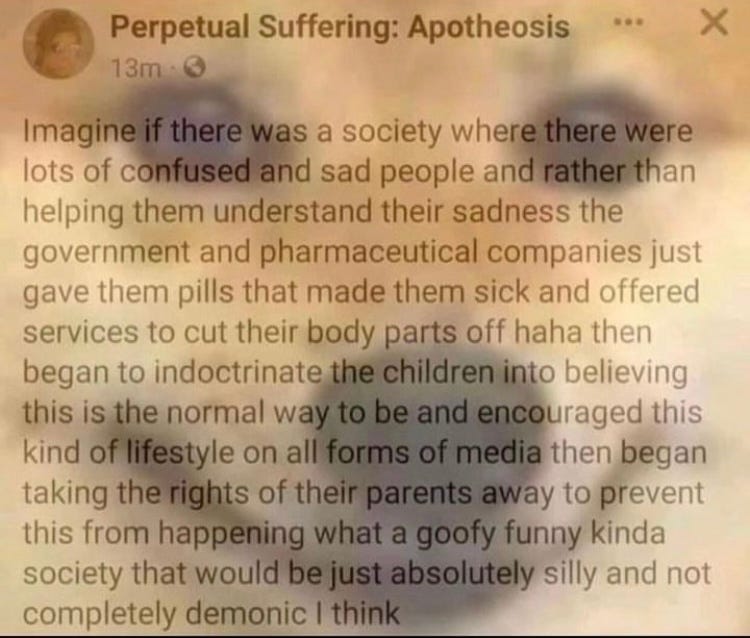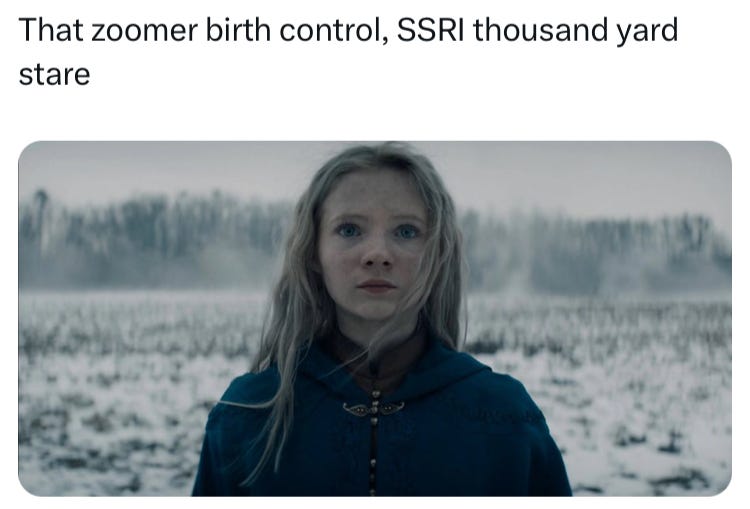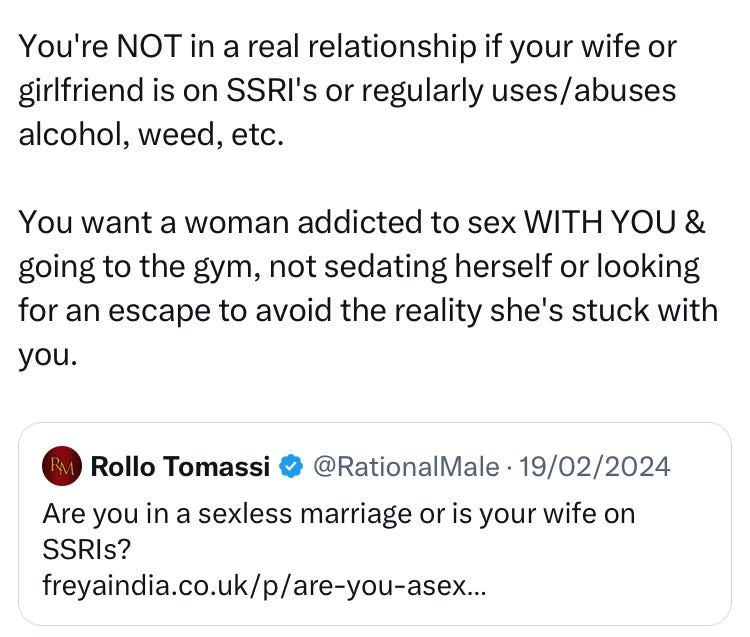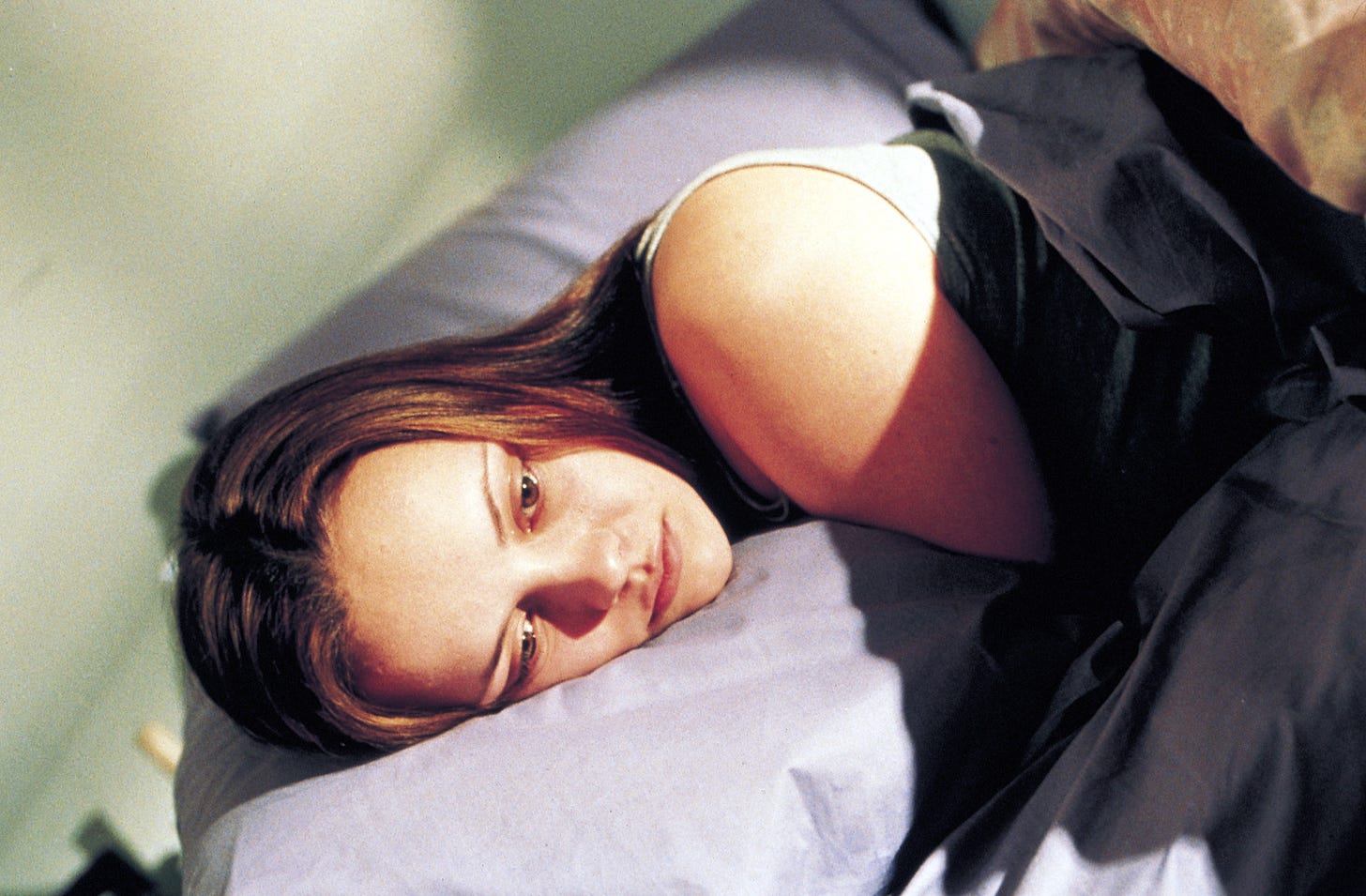There are things to get used to: the grainy acid burn down your throat whenever you swallow them dry. The cold swoop of withdrawal when you forget to take them for a couple of days, a slow tilting of your insides, like seasickness. But mostly, you spend the first few weeks waiting for the fog to lift, for the picture to snap into sharp focus.
That moment never really came for me. The process happened in shades so gradual it was impossible to put my finger on how my mental landscape might have changed, or measure any improvement from my unmedicated self. And when I did try, so much of what I blamed on the meds could also be chalked up to life - to infatuations, break-ups, COVID quarantine, pre-menstrual depression, grief. I didn’t know if how I dealt with those things was different, now; it was impossible to compare the depths of past and present sadnesses. Life continued much as it had before, except now I had a pill that would make me feel sick if I forgot to take it. For a while I stopped biting my nails so vigorously, but that was probably just because I’d painted them, and the varnish tasted bad.
Before writing this piece I asked my friends and online community what their experiences had been like, and their responses were mixed: I’ve been on sertraline for three years and it saved my life. / They didn’t dramatically change my life, but they took the edge off. / I had to try four different drugs to get to one that changed anything for me. / Sometimes, you can’t tell if it’s working, and that’s a good thing; you’ve forgotten how bad things used to be. This is all anecdotal, of course, but I’ve noticed a similar spectrum of experiences reported in research studies, too. In fact, when I was reading around the topic of SSRI efficacy, I realised how easy it would be to cherry-pick statistics to support any argument I wanted to make. There are papers which suggest that most of their benefits arise solely from the placebo effect; but then there are others concluding that 60% of people respond to the drugs in the first two months. The most recent research asserts pretty confidently that the latter is true, but there’s enough diversity out there for you to claim, if you wanted to, that we have “no idea if they even work”, making it a very easy battle-ground if you’re looking to wage a culture war.
The pipeline begins very rationally. You can start by expressing fair critique of Big Pharma, or arguing, rightly, that the NHS prescribes so many anti-depressants because it doesn’t have the funding for longer-term, necessary solutions like psychotherapy. But this can spiral into something darker, nastier in tone. For the last couple of years, it’s felt like the memes haven’t been on our side anymore. Freya India has a piece where she blames the rise in young people identifying as asexual on SSRI-induced sexual dysfunction; in Honor Levy’s short story, Cancel Me, she describes a boy as “careful and impolite, fat from the Prozac and scared of everything, especially other boys”. This might all be happening in an online microcosm, but it still marks a shift, I think - it wasn’t so long ago that popular Instagram accounts were posting slightly twee ‘tag yourself’ memes about different psychiatric medications. (Maybe it’s all My Year of Rest and Relaxation’s fault.)
Like most moral panics these days, the rhetoric pedalled by a certain brand of would-be edgy-chic woman online is just the tip of the iceberg. Dig a little further, and the irony starts to peel away, revealing a dark tangle of misogyny, anti-semitism, ableism, and flat-out rage. If you are a woman and your selfie stumbles onto the wrong side of Twitter, you’ll instantly be accused of having SSRI eyes and zoloft brainrot alongside ‘fluoride stare’; if you are queer, especially trans or gender non-conforming, you might just be quote-tweeted off the platform. Millie has written two really comprehensive and intelligent pieces about the anti-semitism and transphobia that walks hand in hand with SSRI alarmism - I’d go as far as to call them recommended reading for anyone who’s any degree of online.
At the most extreme end of this hysteria, a significant contingent of the right has convinced itself that SSRI use leads people to commit mass shootings, a pattern so obviously correlation rather than causation that to point it out feels futile. But Republican politicians Marjorie Taylor Green and Tucker Carlson have, in the aftermath of tragedy, invoked it as fact. The conspiracy theory got most news coverage around two years ago, but interest has remained steady - type ‘SSRIs’ into the Substack search bar, and the top result is a supposed compilation of decades of evidence that anti-depressants cause mass shootings, listed as a 43 minute long read.
At its core, this philosophy regards SSRIs as an unnecessary and permanent self-altering for the worse, whether they make you dangerous, sexless, or both. The conflation of sex drive with self-hood is particularly noticeable, I think. Tucker Carlson summed it up best when he said “If it steals your sex drive, maybe it’s stealing your soul”. I’m not trying to downplay the fact that sexual side effects of SSRIs have made the lives and relationships of a significant number of people more difficult; it’s not the very real psychological and physical effects I want to question here, but their extensive cultural baggage. It strikes me as interesting that conservatives are so up in arms, even referring to post-SSRI sexual issues as chemical castration, when they aren’t otherwise keen on young people even learning about sex in the first place.
To the far right, if you’re a woman, it’s nearly impossible to fuck correctly. We are all fucking too much, or too little; fucking the wrong gender(s), fucking in the wrong ways. If queer sex, or casual sex, makes you depraved, corrupting and ungodly, then having less sex because you’re on SSRIs makes you numb, brain-rotted, sheeple. But there is a bottom line - both take away what is, to them, your essential nature. Taken to its logical end, this would mean that being true to yourself is all about being thin, muscular, having dutiful amounts of monogamous straight sex, having children - even if, amid all of that homesteading, you’re deeply unwell.
In the face of all this, we like to equate mental health problems to physical ones, suggesting that taking SSRIs is like taking painkillers for a broken leg - that SSRIs are as simple as mental pain-killers, I suppose. I can understand why we make this argument, even if we’re slightly flattening the truth; you can make a slogan out of it, it invokes the science which is, largely, on our side. But I think that comparison reassures us, too. After all, a broken leg says nothing about who we are. If anxiety or depression or OCD is the same, then we can neatly separate the scientific and chemical from the personal. It’s nothing to do with our identity, or our selfhood - and crucially, it’s not our fault.
And we’re right - I’m sure for many people this analogy rings true. But I struggle to believe that my own mental illness is not also a fundamental part of me. OCD relies on paralysing fears and subsequent patterns of thought, which after twenty-four years now feel as well-worn into my brain as the grooves in the skin of my palm. Even with the meds, I still tread those paths almost daily - I’m not sure I can meaningfully separate them from myself.
I’m reminded of a scene in Elizabeth Wurtzel’s memoir Prozac Nation; her mother blames Elizabeth’s mental illness on drugs, the divorce, growing up in the city, and Elizabeth confronts her with the words - “Why don't you consider the idea that I might just be, at the core, completely depressed?” It’s a fatalistic outburst, but there’s a softer way to understand what she means. Some of us are born into selves who will always benefit from medication of some sort, and that carries no moral judgement either way, it’s just likely true. If that makes us soulless, I’m not sure I want one.
No-one is going on selective serotonin reuptake inhibitors on a whim, or because they’ve seen people on the Internet who feel nothing, and they want to give it a try too. Behind each moral panic is a million individual cases, millions of people going to see their doctors because they are anxious, depressed, in pain. They don’t deserve ludicrous speculation that the drugs might lead them to commit atrocities; they don’t deserve to be called sexless, or soulless, or numb. How much sex they may or may not be having is nobody’s business but their own - and it certainly isn’t Tucker Carlson’s.
When I was diagnosed with OCD, and prescribed sertraline, it was over the phone, at the peak of the pandemic. I remember walking aimlessly around the block in a faint misting rain, because I didn’t want to do the call in my room and be overheard. I remember the GP telling me that, regretfully, the waiting list for psychotherapy were so long she didn’t think she should even bother putting me on it. And I remember striding off to the pharmacy with the song UK Hun from Drag Race UK S2 in my headphones - we all got disproportionately excited about that season, not much else was exciting in February 2021. I made a group chat with two of my best friends, already on the same medication, called ‘sertraline gang’. I was determined to make some fun out of it.
And is it working? I’m not entirely sure, and I’m not entirely sure how to tell. But here’s what I do know: I don’t care about being part of a pattern, or a symptom of spiritual void, or societal decline. I just want to feel better. I think I probably feel 20% better - and that’s a 20% I’ll take.
Hello :) this piece was really tricky to write! It’s a topic I think is so tricky to do justice, and also quite intense after a few weeks of just writing more personally and informally lol so I hope it’s not too much. Let me know what you think - and thank you to anyone who messaged me with their experiences or thoughts <3
Lots of love,
Ellie x








I’ve been on sertraline for a year now and I literally feel like a different person - in a very, very good way :)
to offer another personal story, I'm one of those people for whom SSRIs saved my life and I'm a completely different person (which is GOOD--happier, healthier, more loving) and
I'm close as I can be to certain that it wasn't just placebo because I tried 4 other meds just as optimistically beforehand